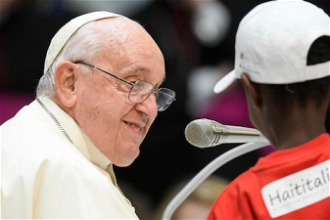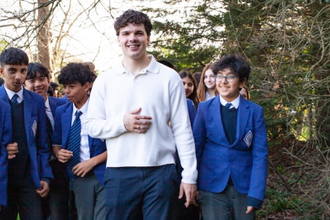A reflection on World Youth Day and climate change

Hundreds of thousands of young people from Europe, but also young people from many other parts of the world will be heading for Lisbon to celebrate World Youth Day (WYD) in the first week of August. Pope Francis will join them there from the 2nd to the 6th. The motto chosen by the pope for this day is taken from Luke's Gospel: "Mary arose and went with haste" (Lk 1:39): hastening to prepare for the journey to Lisbon is what the young people will be doing too.
Although WYDs have been celebrated every year since they were inaugurated, there have been 15 WYDs - actually celebrated together with the pope of the time - since John Paul II held the first world youth day in Rome, 1985. The most recent was held in Panama, January 2019. A significant aspect of that event with the pope is that it linked the synodality theme central to this pontificate with the focus on youth so close to Pope Francis' heart. Panama came half-way between Synod on Youth, held in Rome in October 2018, and Francis' publication of his response to that Synod, his apostolic exhortation Christus Vivit - Christ Lives, in March 2019. This rich document remains one of the best yet published by a pope in regard to young people.
On 14th July this year Francis sent a video message of encouragement: "Any young person who goes to WYD goes because, deep down, he or she has the thirst to participate, to share, to tell their experience and receive the experience of others".
A new feature in Lisbon this year will be what are being called "Rise Up Encounters" - that "rise up" being taken from the words of Jesus to the dead son of the widow of Nain in the Gospel of Luke (7:14), "Young man, rise up". Rise Up Encounters, which will take place in churches and other spaces near the pilgrim reception areas in Lisbon, offer a new model for the WYD catechesis sessions that are an integral part of the world youth days: they challenge the young people to reflect on major themes spotlighted in the pontificate of Pope Francis. In Lisbon they will focus on integral ecology, social friendship, and mercy.
If integral ecology - and the environment in general - had not already been among the topics chosen for reflection and prayer in Lisbon this year, the young people would already be talking about it. Recent experiences of searing heat around the globe will have brought it to their minds. It is a topic that, willy-nilly, has forced itself on to the world's attention over recent months and - in a particular way - since early this month: on the 3rd, 4th, and 6th of July it was on average hotter across the world than it has ever been in the course of human history.
'Ever been' - they are words that easily slip through our minds as just another item in daily news bulletins before our attention turns back to whatever else we were doing. They are, however, words that are extremely significant for young people who still have the next 50 or 60 years of life before them. Younger generations are, for the most part, very sensitive to news about climate change and global warming. After all, it will touch them, their lives, their families, their future far more intensely and directly than those whose lives are already more than half over!
The young people converging on Lisbon are aware that Pope Francis - through his 2015 Laudato Si' encyclical, and repeatedly since that time - has been at the forefront of those world leaders who have called for effective international action to combat climate change and global warming through adaptation and mitigation.
Although Lisbon in early August is usually warm, with average temperatures around 28 to 29 degrees Celsius and occasionally moving up into the mid-30s, it is partly refreshed by breezes coming in from the Atlantic. However, many of the young people taking part in the WYD will be coming in from other parts of Europe, where temperatures in countries such as Spain, Italy, and Greece - and other areas too - have been climbing in recent weeks into the early and even mid-40s Celsius, triggering heat warnings from regional authorities.
This echoed the sweltering heatwave that swept Spain, Portugal and Morocco in April this year, where temperatures surged 20 degrees Celsius higher than normal across large parts of the western Mediterranean. And this mention of the Mediterranean reminds us that most of the heat stored near the surface of the Earth is not in the atmosphere but in the oceans: so far this year many parts of the world's oceans have registered record temperatures.
The reality is that extreme heat, especially when accompanied by high humidity, is dangerous: in fact, it can be a killer. Somewhat unexpectedly, this heat can often enough be associated with widely differing results - wildfires such as those in Greece, and even the storms and flooding experienced days ago in northern Italy. Recent years offer evidence that only too often countries are not sufficiently prepared for such heat or for the levels of variability that climate extremes are beginning to show.
Young people will also be heading to Portugal from countries far away, where the experience of heat and its consequences considerably exceed those seen in Europe. In a weekly briefing in April, the highly-regarded CarbonBrief reported the startling finding that one in two people globally faced all-time record-breaking heat in the past 10 years!
A recent example is Texas, where a crushing heatwave recently pushed the heat index - which combines temperature and humidity - to 48 degrees Celsius. In India, on the other side of the world, blistering heatwaves in the mid-40 degrees Celsius in June combined with high humidity to cause numerous deaths in Uttar Pradesh and elsewhere, especially among the poor who often not only have to keep working in the heat in order to make a living but also suffer from lack of food, potable water and medicine.
The Intergovernmental Panel on Climate Change, sponsored by the United Nations, has - in a series of reports since it was established in 1988 - made abundantly clear that it is above all the build-up of atmospheric CO2 levels (CO2 and certain other gases) caused by the burning of fossil fuels that are responsible for the rise in global warming, especially since the 1950s. They have established that 350 parts per million (ppm) of these gases in the atmosphere is the uppermost safe limit for these gas concentrations if our planet's climate system is to maintain a balance that allows as much heat to escape our planet as it retains. That limit of 350ppm was passed in 1986. Today that figure has risen to 419.3ppm and it continues to rise. If further extreme heat and other serious consequences of climate change are to be avoided we need to return to 350ppm or below.
Laudato Si' is the normal way we refer to Pope Francis' encyclical on the environment and social care because its opening words are taken from Saint Francis of Assisi's beautiful Canticle of the Sun. However, Care for Our Common Home was its actual title and as young people gather with the pope Saint Francis' care for all living things, care for our common home, will be on their minds.
In the video message referred to above the pope encouraged youth to prepare themselves with enthusiasm but also "to put hope in that … have hope". Hope - hope and joy have been words associated with Pope Francis since the beginning of his pontificate. It is in a spirit of hope, not a climate anxiety associated with despair, that Christians are called to confront climate change and the rising heat that is coming with it. This hope is not naïve optimism, but central to the Christian faith that springs from the awareness that God so loved the world that he sent his only Son, the Word made flesh. It is through the death and resurrection of Jesus Christ and the gift of his Spirit that we have this hope.
As the Pope flies to Fatima on Saturday, 5th August, just 75 miles or so from Lisbon, his prayers and the prayers of the young people asking the intercession of the Blessed Virgin Mary - who hastened to help her cousin as the theme of this youth day reminds us - will no doubt include the war in Ukraine alongside the climate crisis and many other challenges facing our world. As always, Pope Francis looks forward in a positive spirit and, above all, with Spirit-given hope.
As he said in Laudato Si', "all is not lost. Human beings, while capable of the worst, are also capable of rising above themselves, choosing again what is good, and making a new start, despite their mental and social conditioning … No system can completely suppress our openness to what is good, true and beautiful, or our God-given ability to respond to his grace at work deep in our hearts" (LS, 205). That is a message that the young people in Lisbon and across the world need to hear if they, with us, are to commit themselves to engage the challenges we are all called upon to face.
In the meantime, says the pope, "we come together to take charge of this home which has been entrusted to us, knowing that all the good which exists here will be taken up into the heavenly feast. In union with all creatures, we journey through this land seeking God … Let us sing as we go. May our struggles and our concern for this planet never take away the joy of our hope" (LS, 244).


















